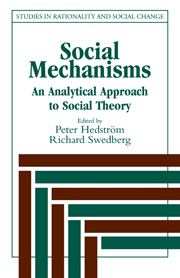Book contents
- Frontmatter
- Contents
- ACKNOWLEDGMENTS
- LIST OF CONTRIBUTORS
- 1 Social mechanisms: An introductory essay
- 2 Social mechanisms and social dynamics
- 3 A plea for mechanisms
- 4 Real virtuality
- 5 Concatenations of mechanisms
- 6 Do economists use social mechanisms to explain?
- 7 Social mechanisms of dissonance reduction
- 8 Social mechanisms without black boxes
- 9 Is sociological theory too grand for social mechanisms?
- 10 Theoretical mechanisms and the empirical study of social processes
- 11 Monopolistic competition as a mechanism: Corporations, universities, and nation-states in competitive fields
- 12 Rational imitation
- AUTHOR INDEX
- SUBJECT INDEX
1 - Social mechanisms: An introductory essay
Published online by Cambridge University Press: 24 March 2010
- Frontmatter
- Contents
- ACKNOWLEDGMENTS
- LIST OF CONTRIBUTORS
- 1 Social mechanisms: An introductory essay
- 2 Social mechanisms and social dynamics
- 3 A plea for mechanisms
- 4 Real virtuality
- 5 Concatenations of mechanisms
- 6 Do economists use social mechanisms to explain?
- 7 Social mechanisms of dissonance reduction
- 8 Social mechanisms without black boxes
- 9 Is sociological theory too grand for social mechanisms?
- 10 Theoretical mechanisms and the empirical study of social processes
- 11 Monopolistic competition as a mechanism: Corporations, universities, and nation-states in competitive fields
- 12 Rational imitation
- AUTHOR INDEX
- SUBJECT INDEX
Summary
Introduction
The main message of this book is that the advancement of social theory calls for an analytical approach that systematically seeks to explicate the social mechanisms that generate and explain observed associations between events. It might appear obvious that every social theory, worthy of its name, should be explanatory. But upon closer examination, it turns out that what often goes under the rubric of social theory, should more properly be viewed as conceptual or sensitizing schemes, and not as explanatory theory proper.I Much of modern social theory has a tendency – just like the Parsonianism of yesterday – to label, relabel, and to describe rather than to explain. In the case of sociological theory, our main concern in this essay, a sustained focus on explanatory social mechanisms would allow sociological theory to reconnect with what we consider to be its most promising and productive era – namely, middle-range sociology of the kind that Robert Merton and Paul Lazarsfeld tried to develop at Columbia University after World War II.
The mechanisms-based approach to social theory should not be confused with a purely descriptive approach that seeks to account for the unique chain of events that lead from one situation or event to another. All proper explanations explain the particular by the general, and as will be demonstrated later, there are general types of mechanisms, found in a range of different social settings, that operate according to the same logical principles.
- Type
- Chapter
- Information
- Social MechanismsAn Analytical Approach to Social Theory, pp. 1 - 31Publisher: Cambridge University PressPrint publication year: 1998
- 269
- Cited by



